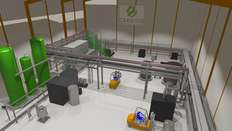- TechnipFMC's Lyon center will assist in building the plant.
- The plant will demonstrate Carbios' Enzymatic Recycling Process for PET.
- Construction starts later this year, with operations expected in 2021.
- The plant will recycle waste PET plastics into monomers for repolymerization.

Project Overview
TechnipFMC’s Lyon center will assist Carbios in building a demonstration plant to showcase Carbios’ Enzymatic Recycling Process. This plant will be located near Lyon, France, and aims to recycle waste PET (polyethylene terephthalate) plastics into monomers, which can then be repolymerized into PET with properties equivalent to virgin PET.
Technology and Process
The Enzymatic Recycling Process developed by Carbios uses proprietary enzymes to break down waste PET plastics into their monomer components. These monomers can then be repolymerized to produce PET with the same technical and physical properties as new, virgin PET. This innovative technology represents a significant advancement in the recycling of PET plastics.
Construction and Timeline
Construction of the demonstration plant is scheduled to begin later this year, with the first operations expected to commence in 2021. TechnipFMC will provide advisory, engineering, procurement, and construction supervision services throughout the project.
Collaboration Goals
The collaboration between Carbios and TechnipFMC aims to demonstrate the feasibility and efficiency of the Enzymatic Recycling Process on a larger scale. By gaining insights into operational conditions through this demonstration plant, the partnership seeks to pave the way for future commercialization of the technology, enhancing the sustainability of the plastic industry.

